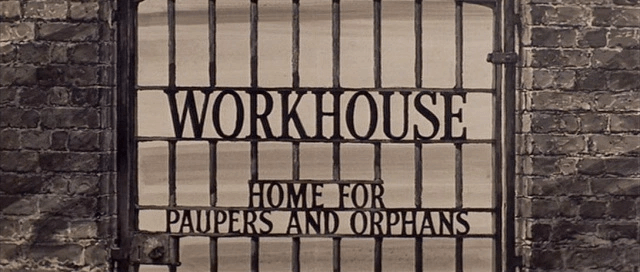Pre-reading discussion: Introducing the topic
What do you know about workhouses?






Warning! This resource is not optimised for use on mobile or tablet devices.
Pre-reading discussion: Introducing the topic
What do you know about workhouses?

Drag and drop each adjective from the adjective bank to the blank in the text where you think it belongs:
I walked with the humane and conscientious gentleman whose duty it was to walk, that Sunday morning, through the little world of poverty enclosed within the workhouse walls. It was inhabited by a population of some fifteen hundred or two thousand paupers, ranging from the infant newly born to the old man dying on his bed.
In a room opening from a squalid yard, where a number of listless women were trying to get warm in the ineffectual sunshine of the tardy May morning, was the nurse, or wardswoman, of that department - herself a pauper - flabby, raw-boned, untidy. On being spoken to about the patients whom she had in charge, she turned round, and fell a crying with all her might. Not for show, but in the deep grief and affliction of her heart; sobbing most bitterly and letting fall abundance of great tears. What was the matter with the nurse? Oh, 'the child' was dead! Oh, the child that was found in the street, and she had brought up ever since, had died an hour ago, and see where the little creature lay, beneath this cloth! The dear, the pretty dear!
You scored … out of . Move some of the adjectives around to try to improve your score.
Well done. You scored … out of .
Highlight words and phrases that suggest how Dickens views the treatment of the twenty-three-year-old servant described in this passage:
In another room, six or eight noisy madwomen were gathered together, under the superintendence of one sane attendant. Among them was a girl of two or three and twenty, of most respectable appearance and good manners, who had been brought in from the house where she had lived as domestic servant on account of being subject to epileptic fits. She was by no means of the same stuff or in the same state of mind as those by whom she was surrounded; and she pathetically complained that the daily association and the nightly noise was driving her mad – which was perfectly evident. If this girl had stolen her mistress's watch, I do not hesitate to say she would have been infinitely better off. We have come to this absurd, this dangerous, this monstrous pass, that the dishonest felon is, in respect of cleanliness, order, diet, and accommodation, better provided for than the honest pauper.
Points to consider:
What do you think and feel about Dickens’ views regarding the treatment of the twenty-three-year-old servant described in the passage?
You should comment on:
Select words and phrases that help the reader to form an impression of the old man described in the passage below. For each selection, add an annotation telling what the text suggests about the old man and the way in which he responds to the interviewer.
On our walking into the dreary perspectives of old men, the following dialogue took place:
'All well here?'
A tall old man of very good address, speaking with perfect correctness, comes forward from somewhere, and volunteers an answer.
'We are very old, sir,' in a mild, distinct voice. 'We can't expect to be well, most of us.'
'Are you comfortable?'
'I have no complaint to make, sir.' With a half shake of his head, a half shrug of his shoulders, and a kind of apologetic smile.
'Enough to eat?'
'Why, sir, I have but a poor appetite,' with the same air as before; 'and yet I get through my allowance very easily.'
'But,' showing a porringer with a Sunday dinner in it; 'here is a portion of mutton, and three potatoes. You can't starve on that?'
'Oh dear no, sir,' with the same apologetic air. 'Not starve.'
'What do you want?'
'We have very little bread, sir. It's an exceedingly small quantity of bread.'
The nurse, who is now rubbing her hands at the questioner's elbow, interferes with, 'It ain't much raly, sir. You see they've only six ounces a day, and when they've took their breakfast, there can only be a little left for night, sir.'
Points to consider:
In what ways is the hoarse old man in this passage similar to and different from the old man described in the previous passage?
Use the tool to select words and phrases that show similarities; and words and phrases that show differences. Then annotate your selection.
‘What has become of the old man who used to lie in that bed in the corner?’
The nurse don’t remember what old man is referred to. There has been such a many old men. The well-spoken old man is doubtful. Another old man pipes out,
‘Charley Walters. He’s dead.’’
As we turn to go out at the door, another previously invisible old man, a hoarse old man in a flannel gown, is standing there, as if he had just come up through the floor.
'I beg your pardon, sir, could I take the liberty of saying a word?'
'Yes; what is it?'
'I am greatly better in my health, sir; but what I want, to get me quite round, is a little fresh air, sir. The regular leave for going out comes round so seldom. If the gentlemen, next Friday, would give me leave to go out walking, for only an hour or so, sir! - '
Who could wonder, looking through those weary vistas of bed and infirmity, that it should do him good to meet with some other scenes, and assure himself that there was something else on earth?
Points to consider: